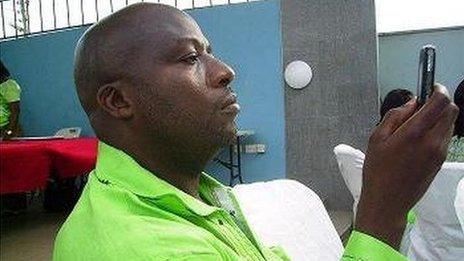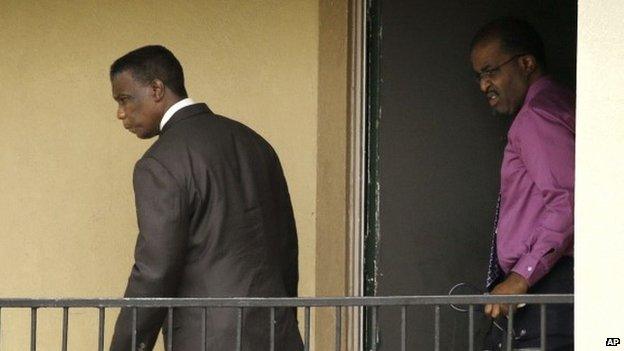Ebola outbreak: Texas checks 100 for exposure
- Published
What do people in Dallas think about the Ebola diagnosis in their city?
As many as 100 people in Texas are being checked for exposure to Ebola, health officials have said.
The list includes "potential or possible contacts" with Thomas Eric Duncan, a Liberian national diagnosed in Dallas on Tuesday, and "will drop".
Four of his relatives have been ordered to stay home while they are watched for signs of the disease, say medics.
Mr Duncan, believed to have caught the disease in Liberia, is in a serious condition in hospital.
He was the first case diagnosed on US soil and on Thursday, Liberian officials said they would prosecute Mr Duncan for lying on an Ebola questionnaire form.

Duncan was a driver for a courier company in Monrovia
In West Africa more than 3,338 have died in the world's worst outbreak of the virus.
There have been 7,178 confirmed cases, with Sierra Leone, Liberia and Guinea suffering the most.
Leading charity Save the Children has warned that Ebola was spreading at a "terrifying rate" in West Africa, with the number of new recorded cases doubling every few weeks.
UK Foreign Secretary Philip Hammond has called for urgent decisive action, including more financial aid, doctors and nurses, from the international community at a conference in London.

A health official leaves an apartment at the complex where Mr Duncan was staying
In Texas on Thursday, Department of State Health Services spokeswoman Carrie Williams described the department's list of 100 people as "a very wide net" of individuals "who have had even brief encounters with the patient or the patient's home".
"The number will drop as we focus in on those whose contact may represent a potential risk of infection," she said.
Health commissioner Dr David Lakey said four of Mr Duncan's close relatives had been ordered to stay at home and not receive visitors until 19 October.
Police have been posted outside their home to be sure and officials are delivering groceries to the home and preparing to have it professionally cleaned.
Workers were scrubbing the car park outside the apartment with high-pressure water and bleach, Reuters reported.
Within 24 hours of Mr Duncan's diagnosis, Texas health officials identified 12-18 people who came into contact with him at his house, including his partner and her five children.
None of these people has yet exhibited any symptoms, Dallas County Judge Clay Jenkins said on Thursday afternoon.
British nurse William Pooley speaks of "the horror and misery" of death from Ebola in Sierra Leone
Mr Duncan is believed to have contracted Ebola as he helped transport a pregnant woman stricken with the virus.
But when filling out a form prior to leaving Liberia two weeks ago, he answered "no" to a question about whether he had cared for an Ebola patient.
"We wish him a speedy recovery; we await his arrival in Liberia" to face prosecution, Binyah Kesselly, the chairman of the board of directors of the Liberia Airport Authority, said.
Mr Duncan was initially sent home from hospital with antibiotics and not admitted and isolated for another two days.
The disease, which is not contagious until symptoms appear, is spread via close contact with bodily fluids.

Ebola virus disease (EVD)

Symptoms include high fever, bleeding and central nervous system damage
Spread by body fluids, such as blood and saliva
Fatality rate can reach 90% - but current outbreak has mortality rate of about 70%
Incubation period is two to 21 days
There is no proven vaccine or cure
Supportive care such as rehydrating patients who have diarrhoea and vomiting can help recovery
Fruit bats, a delicacy for some West Africans, are considered to be virus's natural host